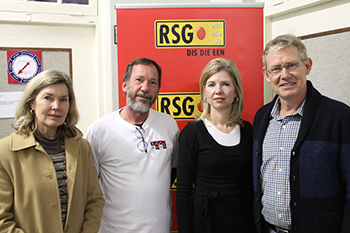Latest News Archive
Please select Category, Year, and then Month to display items
02 January 2025
|
Story Gerda-Marie van Rooyen
|
Photo Supplied
 Leading the research in South Africa is Prof Linus Franke from the Department of Soil, Crop and Climate Sciences.
Leading the research in South Africa is Prof Linus Franke from the Department of Soil, Crop and Climate Sciences.
Scientists are actively pursuing the successful breeding of diploid hybrid potatoes from inbred lines. This is expected to revolutionise potato breeding as it holds the key to rapid genetic progress. It will introduce new varieties for commercialisation through seed. Currently, existing potato variants have a gene that renders self-pollinated seeds infertile.
Prof Linus Franke, an academic in the Department of Soil, Crop and Climate Sciences at the UFS, is leading the research in South Africa. “This technology allows the production of genetically uniform potato seed that is easy to transport and largely disease-free.” He says this differs from conventional breeding whereby only vegetative propagation is possible due to tetraploid varieties in potatoes. It also risks carrying pests and diseases from one generation to the next – leading to the accumulation of pests and diseases with each round of multiplication.
Seed innovation
Prof Franke explains that Solynta BV, a seed company based in the Netherlands that produces potato varieties that can be grown from seed, has included South Africa in their research efforts because it is one of Africa’s largest producers and exporters. Through his academic relationship with Wageningen University and Research, a Dutch institution renowned for its agricultural endeavours and food production, the UFS became involved in researching hybrid potatoes grown from seed.
Diploid seeds containing two sets of chromosomes allow easier gene manipulation to increase predictability and speedier genetic progress. The breeding approach enables the incorporation of tolerance to pests, diseases, abiotic stresses (cold, heat, drought) and other desired genetic traits.
Although Prof Franke is optimistic about this research, he is not blind to disadvantages. “Potato seeds are tiny and have little energy reserves, making it harder to grow potatoes from seed than from tubers.” He says potatoes from seed will take longer to cultivate than tubers, as farmers need to grow plantlets from seeds first, adding six weeks to the growing period. “It is possible that commercial farmers can grow potatoes directly from seed. Alternatively, perhaps more likely, specialised growers will produce tubers of potatoes from seed; these tubers are then sold as seed tubers to other potato farmers, who then continue their normal practices of producing potatoes for the market from tubers.”
Financial benefits
Prof Franke says farmers have reason to get excited. “Seed potatoes will reduce input costs, as varieties with enhanced tolerance to pests and diseases require less pesticides. Planting one hectare of potatoes requires three to four tonnes of potato tubers, but only one 25 g packet of potato seeds.” Since potatoes are a more valuable commodity than maize, this technology might also increase farmers’ income potential.
RSG Crossword Tournament helps to celebrate language
2016-07-27

Dr Annette de Wet (left), Assistant Director
of the Unit for Language Development in
the Centre for Teaching and Learning at
the UFS, Albe Grobbelaar from XWord,
Prof Angelique van Niekerk, Head of the
Department of Afrikaans and Dutch, German
and French, and Prof Lucius Botes, Dean of the
Faculty of the Humanities, during the launch
of the RSG Crossword Tournament.
Photo: Jóhann Thormählen
Sometimes it is difficult for language departments to be topical and to show their relevance for the people out there. However, with the RSG Crossword Tournament, this became possible and Afrikaans could be celebrated in a positive manner. This is what Prof Angelique van Niekerk, Head of the Department of Afrikaans and Dutch, German and French at the University of the Free State (UFS), had to say about this initiative.
Interest during the Vrystaat Arts Festival exceeded all expectations. Altogether, 46 participants from across the country participated on 15 and 16 July 2016. Ilse van Hemert from Pretoria was crowned as the first South African crossword champion.
New dimension to language milieu
Prof Van Niekerk said people are familiar with crossword puzzles from the media, and it was the first time that a tournament like this was presented to the public in South Africa. “This tournament brings something like linguistics and linguistic sensitivity to the fore,” she said. “It is another dimension of the language milieu.” This is exactly why her department would like to see it grow in future.
Wordplay serves as inspiration
The idea for the tournament is based loosely on the film, Wordplay (2006), which is set in New York, and the annual New York Times Crossword Tournament. The South African Tournament was presented in conjunction with the crossword group, XWord, Prof Van Niekerk’s department, and the radio station RSG as brand sponsor.
Crossword puzzles and blockbusters crosswords completed
“This tournament brings something like
linguistics and linguistic sensitivity to
the fore.”
Albe Grobbelaar from XWord said the winners were determined on a points basis. “Competitors had to complete two crossword puzzles and one blockbuster crossword. The difference between the two is that a blockbuster’s clues are within the blocks or grid, but with the crossword, you have white and black blocks with the clues separate on the outside.”